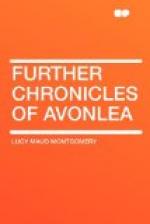That year I hated the spring—I, who had always loved it so. As boy I had loved it, and as man. All the happiness that had ever been mine, and it was much, had come to blossom in the springtime. It was in the spring that Josephine and I had first loved each other, or, at least, had first come into the full knowledge that we loved. I think that we must have loved each other all our lives, and that each succeeding spring was a word in the revelation of that love, not to be understood until, in the fullness of time, the whole sentence was written out in that most beautiful of all beautiful springs.
How beautiful it was! And how beautiful she was! I suppose every lover thinks that of his lass; otherwise he is a poor sort of lover. But it was not only my eyes of love that made my dear lovely. She was slim and lithe as a young, white-stemmed birch tree; her hair was like a soft, dusky cloud; and her eyes were as blue as Avonlea harbor on a fair twilight, when all the sky is abloom over it. She had dark lashes, and a little red mouth that quivered when she was very sad or very happy, or when she loved very much—quivered like a crimson rose too rudely shaken by the wind. At such times what was a man to do save kiss it?
The next spring we were married, and I brought her home to my gray old homestead on the gray old harbor shore. A lonely place for a young bride, said Avonlea people. Nay, it was not so. She was happy here, even in my absences. She loved the great, restless harbor and the vast, misty sea beyond; she loved the tides, keeping their world-old tryst with the shore, and the gulls, and the croon of the waves, and the call of the winds in the fir woods at noon and even; she loved the moonrises and the sunsets, and the clear, calm nights when the stars seemed to have fallen into the water and to be a little dizzy from such a fall. She loved these things, even as I did. No, she was never lonely here then.
The third spring came, and our boy was born. We thought we had been happy before; now we knew that we had only dreamed a pleasant dream of happiness, and had awakened to this exquisite reality. We thought we had loved each other before; now, as I looked into my wife’s pale face, blanched with its baptism of pain, and met the uplifted gaze of her blue eyes, aglow with the holy passion of motherhood, I knew we had only imagined what love might be. The imagination had been sweet, as the thought of the rose is sweet before the bud is open; but as the rose to the thought, so was love to the imagination of it.
“All my thoughts are poetry since baby came,” my wife said once, rapturously.
Our boy lived for twenty months. He was a sturdy, toddling rogue, so full of life and laughter and mischief that, when he died, one day, after the illness of an hour, it seemed a most absurd thing that he should be dead—a thing I could have laughed at, until belief forced itself into my soul like a burning, searing iron.




